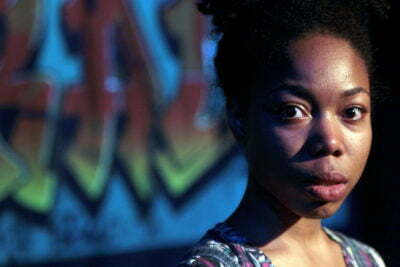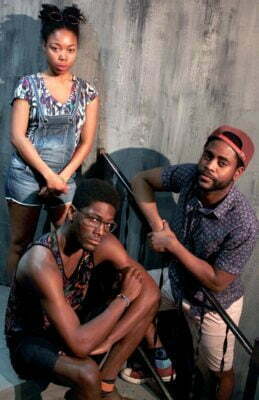Feral
 By Shepsu Aakhu
By Shepsu Aakhu
Directed by Carla Stillwell
Produced by MPAACT
Playing at the Greenhouse Theater, Chicago
Chicago’s Own Tragedy Onstage
Shepsu Aakhu’s new play Feral is set in Chicago this upcoming summer. Given the events it depicts—the shooting of a young black man by the police for a minor crime and the subsequent unrest—hopefully it is not prescient, but it’s impossible to watch without an overwhelming sense of dread. Feral is the conclusion of the Ma’at Production Association of Afrikan Centered Theatre’s Black Lives Matter season, which puts theatre artists’ frequent claim to be directly engaged with the community’s issues to the test. The resulting story of a tragic young idealist, his enraged peers, grieving, guilt-ridden family, and baffled mainstream media may not surprise anybody willing to see a show bearing the Black Lives Matter moniker, but under Carla Stillwell’s direction, it elicits strong emotions, without allowing them to dissipate into catharsis.
Urban correspondent Anthony Davis (Darius Edward Leaks) breathlessly reports on the local news that the word “feral” is being spray-painted throughout middle-class neighborhoods on the south side. While the vandalism remains mysterious, authorities are all but advising people to panic. The spray-painter, Francis Xavier, or FX (Benjamin Timothy Jenkins), is, in fact, a twenty-year-old advertising major, who enjoys taunting even his best friend, Toma (Sheldon Brown), and little sister, Lacey (Victoria Allen) by telling them “feral” means whatever they interpret it as. (He actually does have a specific message in mind, but it’s not revealed until the end of the play.) FX learned in college that people have to be repeatedly exposed to a symbol in unusual ways to really process it, and wants to make a point about the value of black life as a response to all the recent police scandals. Toma and Lacey tell him he’s stupid, as does his father, Mr. Ward (George C. Stalling), who worked hard to secure a middle-class lifestyle for his children, and sees FX throwing it away.

Early in the play, we see FX get shot by a white police officer in what is unambiguously murder. The rest of the play shifts between before and after the shooting, so that we get to know FX better, and see how his family deals with their grief and being thrust into the national spotlight. Jenkins and Allen have an adorable big brother-little sister dynamic. Even though she thinks he’s making a huge mistake, Lacey’s natural instinct is to trust and admire him, and she shamelessly uses her cuteness to get his attention. Jenkins accurately captures the infuriating combination of naiveté and arrogance that so often fuels youth activism. FX actually does worry that his message will become diluted through people repeating it because it’s cool, but he is sure that doing something is better than doing nothing. As is also often the case with youth activism, another one of his major motivators is guilt. Jessica Kuehau Wardell’s scenic design clearly demonstrates what a nice old Hyde Park house FX grew up in, and there’s obvious self-loathing and uncertainty bubbling away beneath his zen exterior.
The scenes which the audience I attended with responded the most audibly to were those between Mr. Ward and reporter Anthony Davis. Mr. Ward sardonically surmises that Davis intends to either use him to quell the riots, or paint him as a bitter agitator responsible for putting his son on the wrong path. He refuses to cede control of the conversation to him, but his desires are frustratingly vague beyond “stop treating us like dirt,” and Davis resists giving him a chance to express them, anyway. While Davis is written as insufferably pretentious, Stalling’s performance as Mr. Ward is heartbreaking. Following his son’s death, guilt is written into every line on his face, and his pride is shattered. But when it recovers, it does so gloriously. Aakhu doesn’t pretend that this story has a tidy ending. It’s better off open-ended, and asks us to acknowledge that the imperfections of the people it depicts is what makes them people. Beyond the politics of the moment, Feral is also a moving family drama, and will hopefully be seen by more people whom it is sure to impact.
Recommended
Jacob Davis
Reviewed April 28, 2016
This show has been Jeff recommended.
For more information, see Feral’s page on Theatre in Chicago.
Playing at the Greenhouse Theater, 2257 N Lincoln Ave, Chicago.

